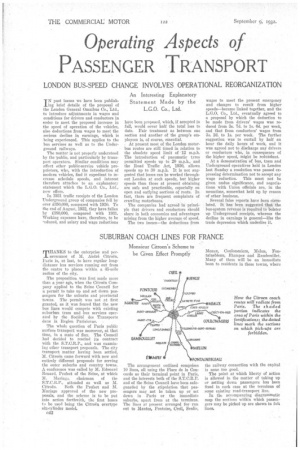Operating Aspects of PASSENGER TRANSPORT
Page 64

If you've noticed an error in this article please click here to report it so we can fix it.
LONDON BUS-SPEED CHANGE INVOLVES OPERATIONAL REORGANIZATION
An Interesting Explanatory Statement Made by the L.G.O. Co., Ltd. INpast issues we have been publishing brief details of the proposal of the London General Omnibus Co., Ltd., to introduce adjustments in wages and conditions for drivers and conductors in order to meet the proposed increase in the speed of operation of the vehicles, also deductions from wages to meet the serious decline in earnings, which is being experienced. This applies to the bus services as well as to the Underground railways.
The matter is not properly understood by the public, and particularly by transport operators. Similar conditions may affect other public-service vehicle proprietors, who, with the introduction of modern vehicles, find it expedient to increase schedule speeds, and interest therefore attaches to an explanatory statement which the L.G.O. Co., Ltd., now offers.
In 1931 traffic receipts of the London Underground group of companies fell by over £350,000, compared with 1930. To the end of August, 1932, they have fallen by £380,000, compared with 1931. Working expenses have, therefore, to be 'educed, and salary and wage reductions
have been proposed, which, if accepted in full, would cover half the total loss to date. Fair treatment as between one section and another of the group's employees is, of coarse, essential.
. At present most of the London motorbus routes are still timed in relation to the obsolete speed limit of • 12 m.p.h. The introduction of pneumatic tyres permitted speeds up to 20 m.p.h., anti the Road Traffic Act, 1930, allows speeds up to 30 m.p.h. It is not suggested that buses can be worked throughout London at such speeds, hut higher speeds than those at present obtaining are safe and practicable, especially on open and outlying, sections of route. In fact, there are frequent complaints of crawling motorbuses.
The companies had agreed in principle that drivers and conductors should share in both economies and advantages arising from the higher average of speed.
The two issues—the deductions from
wages to meet the present emergency and changes to result from higher speeds—became linked together, and the L.G.O. Co., Ltd., eventually agreed to a proposal by which the deduction to be made from drivers' wages was reduced from 3s. 7d. to Is. 6d. per week, and that from conductors' wages from 3s. 2d. to 1s. per week. The further suggestion was to curtail by half an hour the daily hours of work, and it was agreed not to discharge any drivers or conductors who, in consequence of the higher speed, might be redundant.
At a demonstration of bus, tram and Underground operatives held in London last Sunday a resolution was passed expressing determination not to accept any wage reduction. This must not be given undue significance, and negotiations with Union officials are, in the meantime, somewhat held up by reason of other business.
Several false reports have been circulated. It has been suggested that the bus-system revenue is required to bolster up Underground receipts, whereas the decline in earnings is general—like the trade depression which underlies it.












































































































